Pluto - Study guides, Class notes & Summaries
Looking for the best study guides, study notes and summaries about Pluto? On this page you'll find 266 study documents about Pluto.
Page 3 out of 266 results
Sort by
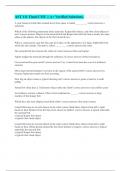
-
AST 111 Final CMU || A+ Verified Solutions.
- Exam (elaborations) • 19 pages • 2024
-
Available in package deal
-
- $12.99
- + learn more
A rock found on Earth that crashed down from space is called _________. correct answers a meteorite Which of the following statements about asteroids, Kuiper belt objects, and Oort cloud objects is true? correct answers Objects in the asteroid belt and Kuiper belt orbit the Sun in nearly the same plane as the planets, but objects in the Oort cloud do not. When a comet passes near the Sun, part of it takes on the appearance of a large, bright ball from which the tail extends. This part is c...
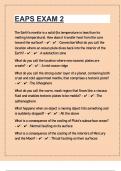
-
EAPS 60 EXAM 2 QUESTIONS AND ANSWERS
- Exam (elaborations) • 13 pages • 2024
- Available in package deal
-
- $7.99
- + learn more
The Earth's mantle is a solid (its temperature is less than its melting temperature). How does it transfer heat from the core toward the surface? - ️️Convection What do you call the location where an ocean plate dives back into the interior of the Earth? - ️️A subduction zone What do you call the location where new oceanic plates are create? - ️️A mid-ocean ridge What do you call the strong outer layer of a planet, containing both crust and cold uppermost mantle, that comprises ...
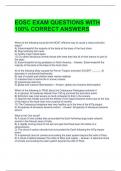
-
EOSC EXAM QUESTIONS WITH 100% CORRECT ANSWERS
- Exam (elaborations) • 7 pages • 2024
-
Available in package deal
-
- $12.49
- + learn more
EOSC EXAM QUESTIONS WITH 100% CORRECT ANSWERS Which of the following would be the MOST effective way to cause a mass extinction today? A) Exterminate/kill the majority of the biota at the base of the food chain. B) Stop fertilizing farm land. C) Acidify major inland lakes. D) Cut down deciduous forests (those with trees that lose all of their leaves for part of the year). E) Exterminate/kill all top predators in North America. - Answer- Exterminate/kill the majority of the biota at t...
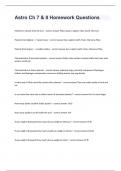
-
Astro Ch 7 & 8 Homework Questions with answers 2024
- Exam (elaborations) • 4 pages • 2024
- Available in package deal
-
- $9.99
- + learn more
Astro Ch 7 & 8 Homework QuestionsFarthest to closest from the Sun: - correct answer Pluto, Saturn, Jupiter, Mars, Earth, Mercury Planets from highest --> lowest mass: - correct answer Sun, Jupiter, Earth, Mars, Mercury, Pluto Planets from largest --> smallest radius: - correct answer Sun, Jupiter, Earth, Mars, Mercury, Pluto Characteristics of terrestrial planets: - correct answer Solid, rocky surface; located within the inner solar system; small size Characteristics of Jovian ...
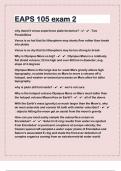
-
EAPS 105|95 exam 2 Questions With Answers|2025
- Exam (elaborations) • 18 pages • 2024
- Available in package deal
-
- $8.49
- + learn more
why doesn't venus experience plate tectonics? - ️️Two Possibilities Venus is so hot that its lithosphere may slowly flow rather than break into plates Venus is so dry that its lithosphere may be too strong to break Why is Olympus Mons so big? - ️️Olympus Mons is a relatively flat shield volcano; 22 km high and over 600 km in diameter; avg. slope of 4 degrees Olympus Mons is this large due to: weak Mars gravity allows high topography, no plate tectonics on Mars to move a volcano of...
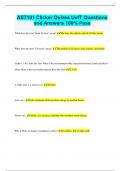
-
AST101 Clicker Quizes UofT Questions and Answers 100% Pass
- Exam (elaborations) • 32 pages • 2024
-
- $9.99
- + learn more
AST101 Clicker Quizes UofT Questions and Answers 100% Pass What does the term "Solar System" mean? The Sun, the planets, and all of their moons What does the term "Universe" mean? The totality of all space, time, energy, and matter Earth is 1 AU from the Sun. What is the maximumpossible separation between Earth and Mars? (Hint: Mars is the next farthest planet from the Sun) 2.5 AU A 'light year' is a measure of: distance Stars are... balls of plasma which produce energy ...
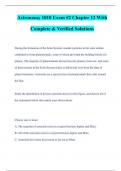
-
Astronomy 1010 Exam #2 Chapter 12 With Complete & Verified Solutions
- Exam (elaborations) • 12 pages • 2023
-
- $10.49
- + learn more
During the formation of the Solar System, smaller particles in the solar nebula combined to form planetesimals, some of which provided the building blocks for planets. The majority of planetesimals did not become planets, however, and some of them remain in the Solar System today as debris left over from the time of planet formation. Asteroids are a special class of planetesimals that orbit around the Sun. Study the distribution of known asteroids shown in this figure, and choose all of t...
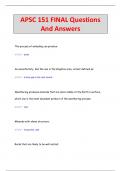
-
APSC 151 FINAL Questions And Answers
- Exam (elaborations) • 25 pages • 2024
- Available in package deal
-
- $12.49
- + learn more
Evidence that Mercury has a liquid core comes from ~ its stable dynamic magnetic field Solar flares and coronal mass ejections are the result of ~ explosions on the sun when energy stored in the magnetic field is suddenly released Why can volcanoes on Mars reach extreme height ~ lack of tectonics Pluto has mountains made of ____________ and oceans/glaciers made of ____________ ~ water ice, methane/nitrogen What do Jupiter and Saturn have in common? ~ gas giants, metallic hydrogen su...
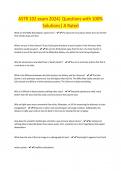
-
ASTR 102 exam 2024| Questions with 100% Solutions| A Rated
- Exam (elaborations) • 31 pages • 2024
-
- $12.99
- + learn more
What are the Milky Way Galaxy's spiral arms? - The spiral arms are places where stars are formed from clouds of gas and dust Where are you in the Universe? If you had to give directions to your location in the Universe, what directions would you give? - We are the third planet away from the Sun. Our Solar System is located in one of the spiral arms of the Milky Way Galaxy, one within the Local Group of galaxies Why do astronomers now label Pluto a "dwarf planet"? - Due to its small size ...
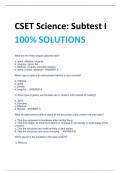
-
CSET Science: Subtest I 100% SOLUTIONS
- Exam (elaborations) • 28 pages • 2024
- Available in package deal
-
- $13.99
- + learn more
CSET Science: Subtest I 100% SOLUTIONS What are the three shapes galaxies take? a. spiral, elliptical, irregular b. irregular, spiral, flat c. elliptical, irregular, pancake shaped d. spiral, circular, elliptical - ANSWER A Which type of galaxy do astronomers believe is very evolved? a. elliptical b. spiral c. barred d. irregular - ANSWER A In which type of galaxy are the stars are in random orbit instead of rotating? a. Spiral b. Pancake c. Elliptical d. Barred - ANSWER C What ...

That summary you just bought made someone very happy. Also get paid weekly? Sell your study resources on Stuvia! Discover all about earning on Stuvia


